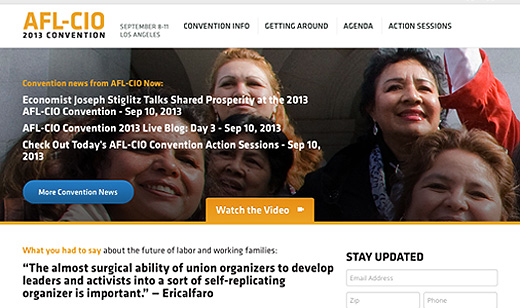
LOS ANGELES – “Young people have a remarkably favorable view of unions,” said Rebecca Greenberg Band, communications organizer for the California Labor Federation and president of the California Young Workers Council. Band is here this week at the AFL-CIO’s 2013 convention.
“According to a recent Pew Research poll, their approval of unions is 10 percent higher than the national average,” she said. And young workers are using a major tool to organize and fortify the labor movement: social media. Union leaders and activists at this convention see forming alliances with social networkers and using the digital tools of tomorrow as a necessity.
“Recent victories triggered by social media represent key moments in motivating young workers and activists,” said AFSCME Communications Director Chris Policano. If older workers get on board, he added, “it provides the means for generational cross-fertilization” and a greater level of solidarity.
LaToya Egwuekwe, communications specialist for the International Association of Machinists and a vice president of the International Labor Communications Association, remarked, “In the last two years, 818.4 million people accessed the Internet via mobile phone. It’s estimated that 100 hours of video are uploaded to YouTube every minute. And Twitter is among the fastest-growing websites worldwide. But despite the widespread adoption of social media, we still grapple with questions on how to use it to benefit the labor struggle.”
However, as Steve Smith, social media specialist with the AFL-CIO in Washington noted, there have already been victories in the labor movement that could not have been achieved without social networks. He pointed to the successful social media campaign against California‘s Proposition 32, a 2012 ballot initiative funded by the billionaire Koch brothers that would have essentially eliminated the ability of unions to engage in politics.
“Everything was riding on the outcome of that effort,” said Smith. “The ripple effect would have been tragic for the labor movement. So we started our campaign. We created Facebook ads, reaching progressive groups and users who ‘liked’ union pages, and then built outward from that point, reaching out to the friends and networks of those people. Because we had a targeted approach, we were connecting with the correct people; we weren’t focusing on just reaching a majority. For example, not many Californians in general are on Twitter compared with other sites, but for us, the right people were. So we focused on that audience.
“We also focused on delivering messages online that formed a narrative and engaged journalists. We tailored our ads to different users and demographics. They piqued a lot of attention. An approach like this uses a minimal amount of resources, and pays dividends.”
Bryan Thomas, online communications coordinator with New York State United Teachers, explained, “The general idea is to incorporate union stories into everyday social media; to share and spread such stories,” which counter right-wing messages that are spread in much the same way. “People are more likely to share news from online sources,” he said. In fact, he noted, online is now the Number 3 news source in the U.S.
There’s also less room for more in-depth, personal reports in the major news publications,” said Thomas. “So social media – particularly microsites (basically stand-alone sub-sections of larger sites) – are a great way to explore the workers that go unnoticed far too often.”
This is important, Smith reiterated, because the new generation – the union members of tomorrow – are not going to be reached in the same manner as their predecessors. “Sixty percent of viewers today use technological devices to skip commercials on television. Twenty-five percent of U.S. voters are no longer watching television,” he said. That latter fact is surely related to an uptick in downloading and online viewing of shows and films using services like Netflix. “So how do we get to them where they are? We get on Facebook. We get on Twitter. We go mobile. We now refer to Facebook as “Basebook,” because that’s where we solidify our base.”
Photo: The AFL-CIO website’s convention coverage page.

MOST POPULAR TODAY


Zionist organizations leading campaign to stop ceasefire resolutions in D.C. area

High Court essentially bans demonstrations, freedom of assembly in Deep South

Afghanistan’s socialist years: The promising future killed off by U.S. imperialism

Communist Karol Cariola elected president of Chile’s legislature






Comments